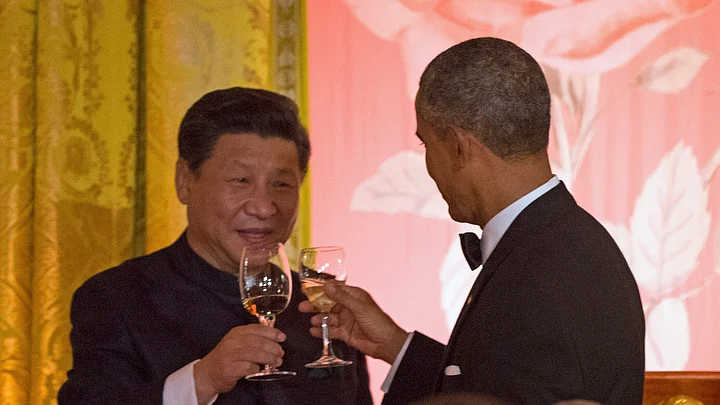The biggest open secret at the annual United Nations General Assembly (UNGA) is that it is not about the UNGA. For world leaders travelling to the event held annually in the United States, this is often about finding photo-opportunities and meetings with senior members of the US administration — with the ones with the American President being the most sought after. These appointments are interpreted as the biggest signs of approval, or the surest signal of slights, and diplomats often begin work months in advance in seeking these meetings and drawing up the agenda.
For Chinese President Xi Jinping, this trip has been only partly political, and with good reason. On August 24 and 25, the Shanghai stock market crashed by over 15 per cent — wiping out billions of dollars of investor worth. On cue, the Dow Jones dropped over 1000 points at opening, the biggest ever drop in points in the index. Understandably, in his first foreign visit since then, Xi’s major task has been assuring American business of the fundamental robustness of the Chinese economy, and stability of Chinese stock markets.
Challenges and Progresses
- US not convinced of substantial change in China’s behaviour even with Xi’s assurances.
- US may not give in to China’s demand of acknowledging the latter as a global power at par with itself.
- Some progress on talks over climate change and reconciliation process in Afghanistan.
- Companies and Universities announced deals with Chinese institutions and corporations.
- China unlikely to back out of its assertive behaviour in the South and East China Seas.
What Xi Said
Xi Jinping made the most of his two days in Seattle driving this point home. His interactions were carefully scripted to seem less wooden thereby giving the impression of being frank and honest. Xi’s comments were peppered with references familiar to the US audience –Earnest Hemingway and mojitos, for instance, almost to a fault. In answering a question on whether his anti-corruption campaign was actually a case of taking out rivals, Xi claimed there was no “House of Cards” going on in his government. Similarly, breaking convention, a Chinese spokesperson held an unscripted impromptu press conference with American reporters in English just ahead of the state dinner with President Obama.
Unfortunately for Xi though, American business and the government will need more to warm up to his claims. His statement in Seattle, claiming that the Chinese government neither supports nor engages in cyber theft and hacking of US businesses for commercial interests, found few buyers. After the bilateral meeting on Friday, Obama announced that the two countries had agreed to not engage in economic cybercrime. Even with Xi standing next to him, he followed up with a caveat – “the question is, are words followed by actions.”
Talking past each other
In some ways, even before they met, Xi and Obama were destined to talk at cross purposes. Since his “shirtsleeves summit” with Obama at California’s Sunnylands estate in 2013, Xi’s goal has been to get the United States acknowledge China as a global power at par with itself. The United States, keen to maintain its status as the preeminent power in the world, and especially in China’s neighbourhood, is unlikely to give in to the demand. Obama and his administration, on the other hand, want China to halt reclamation and militarisation of land features in the South China Sea, and desist from cyberattacks. Xi’s disinclination was apparent in his claim that China was not militarising the island features that it had “the right to uphold its own sovereignty.”
Not All Is Lost
It would be wrong to assume however that Xi’s visit was without progress. In his toast at the state dinner Xi proposed that the two countries “continue to respect and learn from each other, turn our blueprint into reality.” In their meeting the Obama and Xi made advances in working together on climate change, including a way to cap domestic emissions as well as financial contribution by China to aid developing countries tackle climate change. The two also completed new military annexes on air-to-air military manoeuvres and crisis communication, expected to avert unsafe and dangerous passage by aircraft of the two countries near each other following an incident last week over South China Sea.
Also, a testament to the increasing agreement of the two countries in tackling at least certain global issues was visible in the factsheet of the talks that started off by pledging to continue cooperation in economic development and reconciliation process in Afghanistan. Xi’s meeting with business leaders saw distinct interest from leadership of companies in the country, including from Google and Facebook that have limited, if any access to the Chinese market. (Ironically, the Chinese government has been documenting its President’s visit in a widely regularly updated Facebook page that no one in China can access.) Companies and institutions, from University of Washington to Boeing and Microsoft announced a plethora of deals with Chinese institutions and corporations that suggest robust economic and people-to-people connections.
The bottom line in the relationship, though, remains one of disagreement on crucial issues. China is unlikely to back out of its assertive behaviour in the South and East China Seas, where it claims to have a right to expand as part of its quest to reclaim supremacy in its neighbourhood. The United States, with allies and partners in the region looking at it to intercede, will have to decide how far it wants to push China on this issue. Similarly, for all his assurances on cybersecurity, neither US business nor the administration is convinced of substantial change in China’s behaviour. Human rights is another field China obstinately refuses to see eye-to-eye with the rest of the world, and is unlikely to give in anytime soon.
(Deep Pal is a PhD student at the University of Washington, Seattle. He can be followed on Twitter: @DeepPal_)
